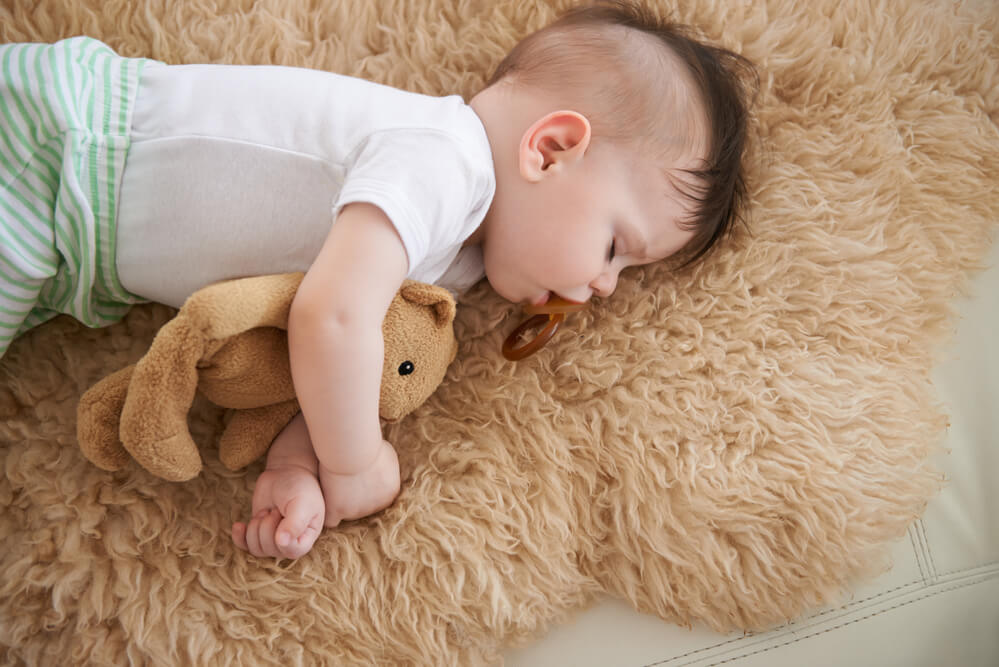Introduction
Becoming a new mom is a journey filled with joy, love, and, admittedly, a fair share of challenges. Among them, figuring out your little one’s sleep schedule can often seem like solving a complex puzzle. But don’t worry, this comprehensive guide is designed to help you understand, manage, and optimize your 9-month-old baby’s sleep schedule.
Each section below provides practical, user-friendly insights, tips, and advice on various aspects of your baby’s sleep, aiming to bring you a step closer to peaceful nights and well-rested days.
Understanding a 9-Month-Old’s Sleep Schedule
Around the nine-month mark, your baby’s sleep schedule typically begins to take shape. Most babies this age need approximately 14 hours of sleep within a 24-hour period. This usually includes two naps during the day and longer sleep at night.
However, it’s crucial to remember that each child is unique, and their individual sleep needs may slightly differ. Pay attention to your baby’s cues and adjust the schedule as necessary to accommodate their needs.
Typical Sleep Patterns for a 9-Month-Old Baby
At nine months, most babies will sleep for about 10-12 hours at night, often with a brief wake-up or two. In addition, they’ll typically have two naps during the day, each ranging from 1-2 hours. The first nap usually happens in the morning, while the second one occurs in the afternoon.
Be mindful that your baby’s sleep pattern can be affected by various factors, including teething, growth spurts, and changes in the environment.
Nighttime Sleep Duration for a 9-Month-Old
The nighttime sleep duration for a 9-month-old baby is typically around 10-12 hours. At this age, some babies may begin to sleep through the night without needing feeding.
However, it’s completely normal if your baby still wakes up for a feed or needs comfort during the night. Consistency in the bedtime routine can help improve your baby’s sleep duration over time.
Nap Schedules for 9-Month-Old Babies
At nine months, your baby will likely need two naps per day – one in the morning and one in the afternoon. These naps can range from 1 to 2 hours each. Nap schedules can vary based on your baby’s individual needs, but a common schedule might be a morning nap around 9:00-10:00 AM and an afternoon nap around 2:00-3:00 PM.

Common Sleep Challenges with 9-Month-Olds
At nine months, you might start to encounter some common sleep challenges. Teething, separation anxiety, and the 9-month sleep regression can all affect your baby’s sleep. They may wake more frequently, have difficulty settling, or resist napping. These issues are a normal part of development and with some patience and consistency, you can help your baby navigate through them.
Table: Typical 9-Month-Old Sleep Schedule
| Time | Activity | Duration |
|---|---|---|
| 7 AM | Wake up & Feed | 1 hour |
| 9 AM | Morning Nap | 1-2 hours |
| 11 AM | Play & Feed | 2 hours |
| 2 PM | Afternoon Nap | 1-2 hours |
| 4 PM | Play & Feed | 3 hours |
| 7 PM | Bedtime routine & Sleep | 10-12 hours |
Tips to Establish a Healthy Sleep Routine for Your 9-Month-Old
A consistent sleep routine can make a world of difference inhelping your 9-month-old get the rest they need. This includes establishing a bedtime routine that signals it’s time to sleep. Bath, reading a story, singing a lullaby, and quiet cuddles are all good bedtime activities. It’s also beneficial to follow a regular schedule for naps, meals, and playtime during the day.
Sleep Regression in 9-Month-Old Babies: What to Expect
Around the nine-month mark, your baby might experience what’s known as sleep regression. This can be marked by more frequent awakenings, shorter naps, or increased resistance to going to sleep. It’s important to remember that sleep regression is a temporary phase, often linked to developmental milestones. Staying consistent with your baby’s sleep routine can help navigate this challenging period.
Safe Sleep Practices for Your 9-Month-Old Child
Ensuring your baby’s sleep environment is safe is crucial. Your baby should always sleep on their back, in their own crib or sleep space, free from soft objects, loose bedding, or any items that could pose a suffocation risk. The crib mattress should be firm, with a tightly fitted sheet. Regulating the room temperature and using a baby monitor can also provide additional safety.
Transitioning Your 9-Month-Old to Two Naps
By nine months, your baby likely needs two naps instead of the three they might have taken as a younger infant. To ease this transition, gradually extend the time between the first and second nap, encouraging a later morning nap. Then, adjust the afternoon nap to start around three hours after the first nap ends. This gradual transition can help your baby adjust to the new sleep schedule smoothly.

Dealing with Separation Anxiety at Bedtime in 9-Month-Olds
Around this age, your baby may start to show signs of separation anxiety, which can affect their sleep. They may become upset when you leave the room, making bedtime more challenging. Try developing a soothing bedtime routine that includes plenty of cuddles and reassurance. You might also use a comforting object, like a soft toy or blanket, as long as it’s safe.
Sleep Training Methods Suitable for a 9-Month-Old
There are several sleep training methods you can consider for your 9-month-old. These include the Ferber method (graduated extinction), chair method, and pick up/put down method, among others. Choose a method that feels comfortable for you and aligns with your baby’s temperament. Remember, consistency is key in any sleep training method you choose.
Night Weaning Strategies for a 9-Month-Old Baby
Night weaning, or reducing the number of night-time feedings, may be appropriate for your 9-month-old if approved by your pediatrician. You can gradually reduce the amount you’re feeding during each night waking or increase the time between feedings. Always consult with a healthcare professional before beginning night weaning to ensure it’s appropriate for your baby’s development and health.

Creating a Soothing Bedtime Routine for a 9-Month-Old
A consistent, calming bedtime routine can signal to your baby that it’s time to sleep. This might include a warm bath, a gentle massage, reading a story, or singing lullabies. Try to start the routine at the same time every night. The routine should be enjoyable for both you and your baby, helping to strengthen your bond while setting the stage for good sleep.
9-Month-Old Baby Sleep Development Milestones
At nine months, many babies can sleep through the night, with two naps during the day. Some babies might start to experience separation anxiety, which can affect their sleep. They also may begin to pull themselves up in the crib, adding anew dimension to crib safety. Remember, every baby is unique, and these milestones can happen at slightly different ages.
How to Deal with Early Morning Wakings in 9-Month-Old Babies
If your baby is waking up too early, it can be a sign they’re not getting enough sleep overall or that their bedtime is too late. Try moving bedtime earlier and ensure your baby’s room is conducive to sleep—dark, quiet, and cool. If early morning wake-ups persist, it may be worth discussing with your child’s healthcare provider.

Impact of Teething on a 9-Month-Old’s Sleep
Teething can cause discomfort, making your baby more likely to wake during the night. Soothing tactics like offering a cold teething toy before bed or using a clean finger to gently massage the gums can help. If your baby seems particularly uncomfortable, consult with your healthcare provider about possible solutions.
Nutrition’s Role in Your 9-Month-Old Baby’s Sleep Pattern
Proper nutrition is critical for good sleep. By nine months, most babies are eating some solid foods, which can help them feel fuller and sleep for longer stretches. Try to maintain regular feeding times, and be mindful of any foods that could cause discomfort or allergic reactions, as this can affect sleep.
Sleep Environment Optimizations for Your 9-Month-Old
Ensuring your baby’s sleep environment is optimized can contribute significantly to better sleep. This includes a cool, dark, and quiet room. Consider using blackout curtains, a white noise machine, and maintaining a room temperature of around 68-72°F (20-22°C). The sleep surface should be firm, with a well-fitted sheet.
Understanding Sleep Cycles of a 9-Month-Old Baby
A baby’s sleep cycle is shorter than an adult’s and includes more time in rapid eye movement (REM) sleep, which is a lighter stage of sleep when dreams often occur. As babies mature, they begin to spend more time in non-REM sleep, which is deeper and more restful. Understanding these cycles can help you better understand your baby’s sleep patterns and needs.
Adjusting Sleep Schedules for Daycare: 9-Month-Old Edition
If your baby is attending daycare, this can impact their sleep schedule. You may need to adjust bedtimes or wake times to align with daycare schedules. Communication with your daycare provider is key to understanding your baby’s daytime sleep needs and ensuring they’re getting enough rest.

Conclusion
Navigating your 9-month-old’s sleep schedule can be a journey with various turns, but it’s a rewarding one. Understanding your baby’s sleep patterns, creating a soothing sleep environment, and implementing a consistent sleep routine can all contribute to better sleep for your baby (and you!). Remember, every baby is unique, and it’s okay if your baby doesn’t align perfectly with “typical” schedules or milestones. The most important thing is that they are healthy and well-rested.
Exploring Further Dynamics
The Role of Physical Development in Your 9-Month-Old’s Sleep
At nine months, babies are often on the move, which can impact their sleep. Rolling, crawling, or even attempting to stand can sometimes disrupt sleep as they practice these new skills. Ensuring ample opportunities for physical play during the day can help your baby sleep better at night.
Handling Illness and Sleep in Your 9-Month-Old
Illness can certainly affect your baby’s sleep. Whether it’s a common cold or an ear infection, your baby might have trouble sleeping due to discomfort or congestion. Keep in touch with your healthcare provider and make your baby as comfortable as possible during this time.
The Influence of Family Dynamics on Your 9-Month-Old’s Sleep
The dynamics of your family can also impact your baby’s sleep. Changes in routine, the presence of older siblings, or family stress can all potentially affect your 9-month-old’s sleep. Maintaining consistency where possible, and offering extra comfort and reassurance during times of change, can help your baby to sleep well.
Screen Time and Its Effect on Your 9-Month-Old’s Sleep
While screen time should be limited at this age, it’s worth noting that exposure to screens close to bedtime can disrupt your baby’s sleep. The blue light emitted by screens can interfere with the production of the sleep hormone melatonin, making it harder for your baby to fall asleep.














